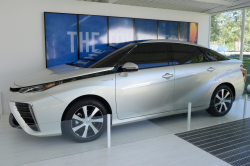— While many automakers focus attention and research on electric or hybrid vehicles, Toyota believes the cars of the future will be fuel-cell cars that run on hydrogen.
Unlike electric cars, a fuel-cell car doesn't require an electrical outlet to charge the car. While electric motors are used to move a fuel-cell car, the electricity for the motors is created by hydrogen gas and the use of special platinum plates.
New technology can face government hurdles because of rules and regulations created for other types of technology. Toyota says one of those rules--created to protect passengers and first responders in an accident--shouldn't apply to their fuel-cell car because following the regulations could cause a failure of the car to operate.
Toyota wants a two-year exemption to a rule that requires electric cars to have high-voltage electric parts isolated to protect against electrical shocks.
The automaker has petitioned the National Highway Traffic Safety Administration claiming the fuel-cell car will protect against shocks, but in a different way than currently regulated. Toyota's car will have insulation on all electrical parts that could cause harm, including high-voltage cables. This is different than current rules allow, but Toyota says different doesn't mean unsafe.

